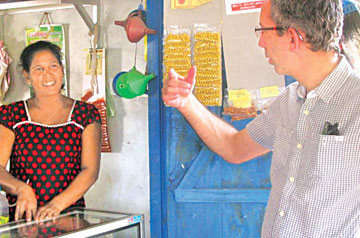|
Missing persons:
No solace yet for kith and kin
by Dhaneshi Yatawara
The end of the conflict has still not brought solace to the loved
ones of missing persons. A large number of people yet battle to find
their loved ones.Over 16,137 people are missing according to the
International Committee of the Red Cross (ICRC) since 1990. The ICRC has
received complaints from across the country since commencing operations
in Sri Lanka in 1989. "Most of the missing persons were breadwinners,"
ICRC spokesperson Sarasi Wijerathne said. A majority of these families
eek a hand to mouth existence.
 The ICRC launched a Family Need Assessment (FNA) program to support
the families of missing persons. It has completed assessments in nine
districts including Jaffna, Mullaitivu and Vavuniya. The ICRC launched a Family Need Assessment (FNA) program to support
the families of missing persons. It has completed assessments in nine
districts including Jaffna, Mullaitivu and Vavuniya.
"Around 375 families in the North, South, East, Western and Central
provinces and in 12 districts were selected for the study. So far we
have spoken to 177 families. We will complete the assessment in June,"
said Wijerathne.
Of the missing persons around 5200 are service personnel of the
tri-services and Police. Among the missing persons around 831 are women
and 1,583 were minors. "We will prepare a report based on the findings
of the assessment to be handed over to the government as a confidential
document and it will help the government to address the needs of these
families," she said.
"What have been revealed so far from the assessment is that the
foremost need is to ascertain the state of their missing relatives,"
said Wijeratne. "As in most cases the missing person being the
breadwinner of the family the economic needs also have become a
priority, she said.
According to data these families need legal and administrative
support. "They have to resolve matters related to pensions, property
disputes and many such cases," she added.
 |
|
ICRC Director Operations
Dominik Stillhart on a five-day visit to Sri Lanka. pic:
icrc.org |
For these people it is a matter of waiting for kith and kin. This has
given rise to the need of psychological support as well," she explained.
The spokesperson explained it has been ICRC's experience with
families of missing persons in other countries such as Nepal as well.
"It will also allow the ICRC to respond to these families," she added.
This is some thing the ICRC cannot do on its own. We can support the
government in its endeavours for these families. What actually needs to
solve this matter is a long term sustained political commitment," she
said.
The ICRC has carried out several interactive sessions with government
officials, representatives of NGOs in counseling to learn more about
supporting the families of the missing, especially by helping them cope
with uncertainty and loss. |

